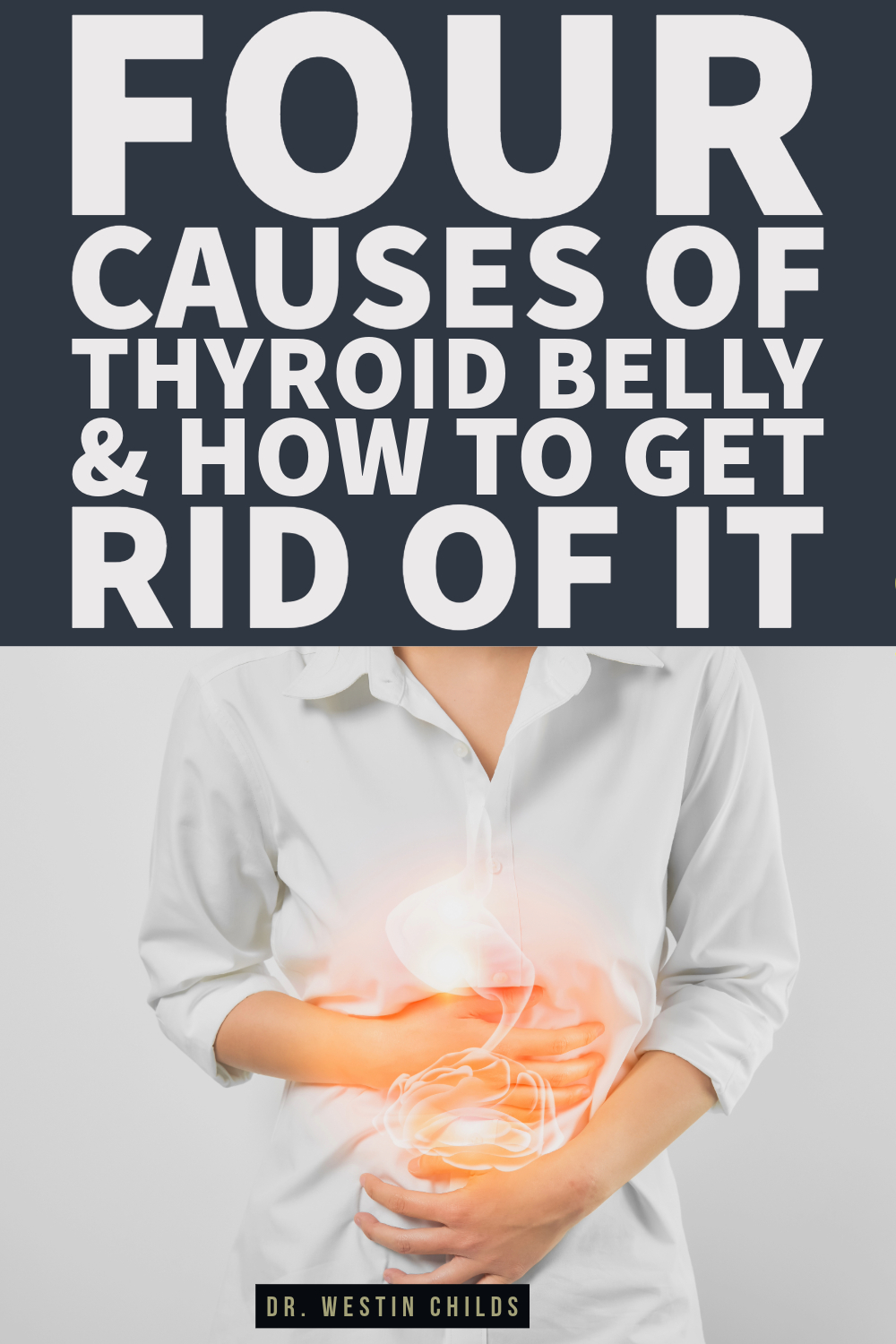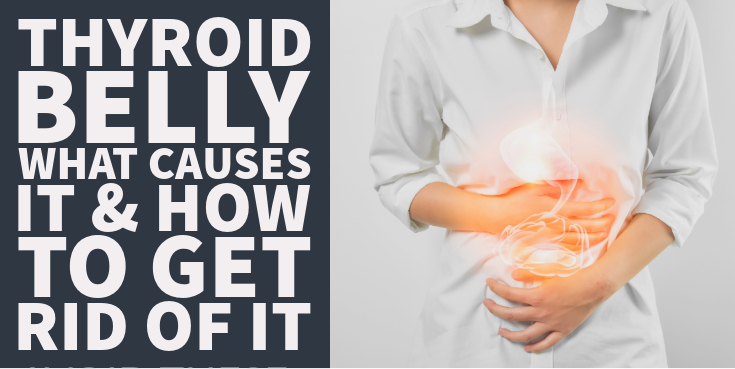What is a thyroid belly?
It’s the characteristic distention of the abdomen that appears to be unique to thyroid patients and its severity can range from mild to severe.
In the most mild cases, it may just look like you ate a large meal, but in the extreme cases, it could make you look pregnant.
Some thyroid patients believe that the thyroid belly shape is related purely to fat while others believe it’s purely related to the gut.
The reality is that it’s caused by a combination of problems all of which can be tied back to your thyroid.
While it’s certainly a frustrating condition to deal with, the good news is that you can absolutely eliminate it with the right treatments.
But in order to do that, you have to understand what causes it:
DOWNLOAD FREE RESOURCES
Foods to Avoid if you Have Thyroid Problems:
I’ve found that these 10 foods cause the most problems for thyroid patients. Learn which foods you should avoid if you have thyroid disease of any type.
The Complete List of Thyroid Lab tests:
The list includes optimal ranges, normal ranges, and the complete list of tests you need to diagnose and manage thyroid disease correctly!
#1. Visceral fat
This is the first and probably most dangerous cause that we will discuss.
Visceral fat is the worst kind of fat that you can accumulate in your body because it surrounds your organs.
And research study after research study suggests that this visceral fat is far more problematic than its cousin known as subcutaneous fat (1).
While both types of fat cause problems, and both types of fat contribute to the thyroid belly shape, visceral fat is the type of fat you want to deal with first because of its long-term danger to your health.
What causes it?
What research has taught us is that some people are more prone to developing subcutaneous fat over visceral fat and at least some of this has to do with genetics.
The other part, the part that matters for this discussion, is related to your lifestyle and thyroid.
We know that visceral fat is often associated with the condition of metabolic syndrome which is a constellation of problems including high cholesterol, insulin resistance, obesity, and high blood pressure (2).
Unfortunately, thyroid dysfunction directly impacts cholesterol, weight, and blood pressure which is probably why 1 out of every 4 people with thyroid disorders have metabolic syndrome (3).
Even though this visceral fat is located deep inside your belly around your organs, as it enlarges, it pushes the contents of your stomach outward.
This causes a distention of your abdomen which contributes to the thyroid belly shape.
#2. Gas And Bloating
Even if visceral fat isn’t contributing to your thyroid belly, it’s VERY likely this next one is:
A dysfunctional gut.
Thyroid patients are prone to developing all sorts of gut conditions that can range from infections (like H. pylori (4)) to bacterial overgrowth syndromes (like SIBO and SIFO).
And the reason for this has to do with how thyroid hormone impacts the motility or movement of your gut.
In the healthy state, thyroid hormone helps your gut move along in a rhythmic motion known as peristalsis (5).
When your thyroid is either too high or too low, it will either speed it up or slow it down, respectively.
Bloating in hypothyroidism is usually from two causes:
#1. Constipation.
And #2. Gas.
And both of these contribute to the thyroid belly shape.
Constipation is pretty easy to understand:
If your gut moves slower than normal then it will take longer for the food that you eat to exit your body.
Instead of having a bowel movement every 24 hours (which is normal), you might have a bowel movement every 36 to 48 hours.
The more constipated you are, the more filled your intestines will be, and the more they will push your stomach outward.

The second has to do with excess production of gas.
Gas is usually the result of swallowing air but it is also produced by the bacteria in your gut when they break down certain foods.
Due to reduced motility of the gut, food stays in the intestinal tract of thyroid patients longer than it should.
As a result, they are more prone to developing overgrowth of bacteria that use this food as fuel.
More bacteria means more gas production which means more abdominal distention.
This condition, known as small intestinal bacterial overgrowth (SIBO), is seen in as much as 50% of patients with hypothyroidism (6) and can be very difficult to treat.
It should go without saying but eliminating gas, bloating, and constipation is necessary if you want a flat stomach.
#3. Subcutaneous Fat
Compared to what we’ve talked about so far subcutaneous fat may not sound nearly as concerning, but it still matters.
As mentioned, this is the type of fat that is found directly underneath your skin.
You can think of this fat as the type of fat that wiggles and jiggles and contributes to cellulite.
For most people, when they say they want to lose belly fat, they are almost always referring to subcutaneous fat because this is the fat they can see and feel with their fingers.
Unfortunately for thyroid patients, they are at increased risk for developing both subcutaneous fat and visceral fat but where they place that fat depends on many factors.
You can think of it like this:
The hypothyroid state promotes weight gain by virtue of its impact on metabolism (7).
The slower your metabolism, the more likely you are to gain weight.
But where your body places that weight depends on your activity level and the quality of the food you are eating.
If you are overeating relatively healthy foods, for instance, you are likely to place most of that in the subcutaneous region.
This is because, aside from having a little extra fat, that fat is still considered “healthy” in that it can produce hormones like leptin to communicate with the brain.
On the other hand, If you are overeating unhealthy foods (think seed oils, fast food, processed foods, etc.), you are more likely to place most of the fat that you gain around your organs.
This is because processed foods and fast foods not only bring in calories but also bring in inflammation which can damage your fat cells leading to adiposopathy.
Most thyroid patients end up with a combination of subcutaneous fat and visceral fat but the exact ratio will vary based on their lifestyle.
Subcutaneous fat may not increase your risk of heart disease, at least not to the same degree as visceral fat, but it still contributes to the thyroid belly shape and is not cosmetically pleasing to the eye, so you still want to eliminate it if you want a flat belly.
#4. Fluid Retention
Due to its impact on a compound called hyaluronic acid (8), the hypothyroid state can result in fluid accumulation in different tissues.
If it happens in your wrist, you’ll end up with carpal tunnel syndrome.
If it happens in your legs, you’ll end up with peripheral edema.
If it happens in your face, you’ll end up with puffy eyes.
And if it happens in your stomach area, you’ll end up with a thyroid belly.
This condition usually isn’t a big problem all by itself but it often co-exists with the other conditions we’ve mentioned previously.
The good news is, this particular problem tends to clear up as you treat the other conditions so it’s usually less of a concern.
Can You Get Rid Of A Thyroid Belly?
Absolutely!
While it can be difficult, it’s not impossible and even if you can’t completely get to a flat stomach, you can almost always get pretty close.
Eliminating that thyroid belly shape is all about targeting the right problem, though, which is why I went through all of the trouble explaining each one.
Once you have figured out which problem(s) are contributing to your thyroid belly, it’s just a matter of treating them one by one.
Here are some tips to help you do just that:
How to eliminate thyroid-related visceral fat
If visceral fat is your main problem then you are going to need to be aggressive which will most likely mean dramatic changes to your lifestyle are necessary.
- Optimize thyroid function. You can do this with natural treatments or with thyroid medication. You’ll know if you are there when your thyroid symptoms completely disappear.
- Completely eliminate processed foods and replace them with whole foods.
- Start exercising, using a combination of weight training and cardiovascular training.
- Take advantage of intermittent or prolonged fasting.
- Use supplements designed to target insulin resistance and leptin resistance like glucomannan, berberine, and alpha lipoic acid.
How to Eliminate Thyroid-Related Subcutaneous Fat
If subcutaneous fat is your primary problem then you should already be at least partially active and already eating mostly whole foods.
- Optimize thyroid function (see above).
- Be mindful of your intake of healthy foods to make sure you aren’t accidentally overeating.
- Use intermittent fasting or prolonged fasting to reduce total caloric intake.
- If you are already exercising, increase the intensity or length of your workouts to enhance metabolic burn.
- Consider adding weight loss supplements to augment your lifestyle efforts.
How to Eliminate Thyroid-Related Gas and Bloating
- Optimize thyroid function (see above).
- Get tested for small intestinal bacterial overgrowth and treat if needed.
- Pay attention to the foods that you eat to find how your gut and body respond to them. Avoid eating foods that make your bloating and gas worse.
- Try supplements to improve gut health like herbal antibiotics, enzymes, l-glutamine, ginger, probiotics, and prebiotics.
- If you are taking an acid blocker for acid reflux, take steps to get off of it as soon as possible.
How to Eliminate Thyroid-Related Fluid Retention
- Optimize thyroid function (see above).
- Exercise regularly to promote drainage of fluid through the lymphatic system.
- Use a massage gun or other vibration devices to promote the movement of fluid through your tissues.
Follow these treatment strategies and stay consistent and you should be able to completely get rid of your thyroid belly for good.
Scientific References
#1. ncbi.nlm.nih.gov/pmc/articles/PMC7563871/
#2. ncbi.nlm.nih.gov/books/NBK459248/
#3. ncbi.nlm.nih.gov/pmc/articles/PMC3354852
#4. ncbi.nlm.nih.gov/pmc/articles/PMC8848460/
#5. pubmed.ncbi.nlm.nih.gov/20351569/
#6. ncbi.nlm.nih.gov/pmc/articles/PMC10303511/
#7. ncbi.nlm.nih.gov/pmc/articles/PMC6711558/
#8. ncbi.nlm.nih.gov/pmc/articles/PMC3219173/



Leave a Reply